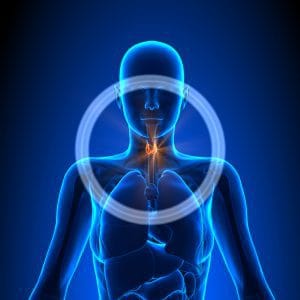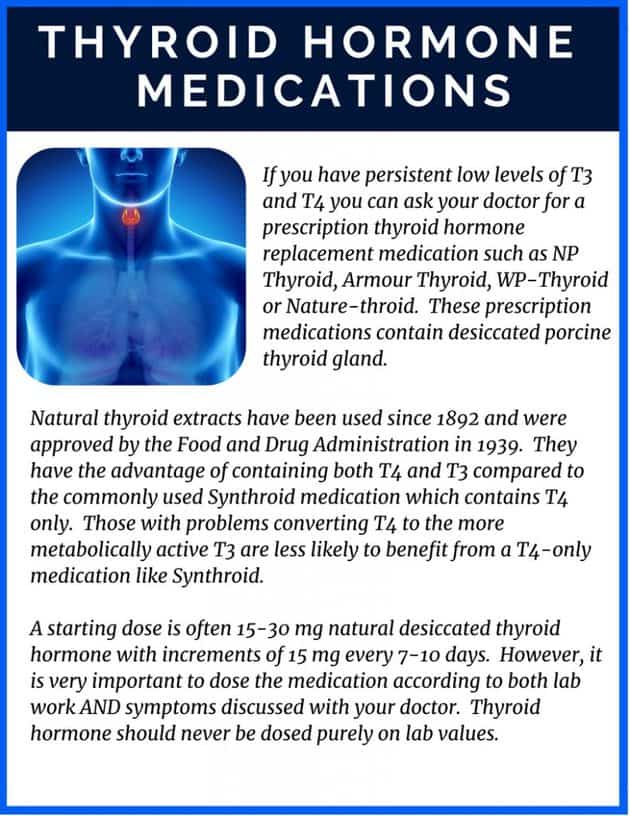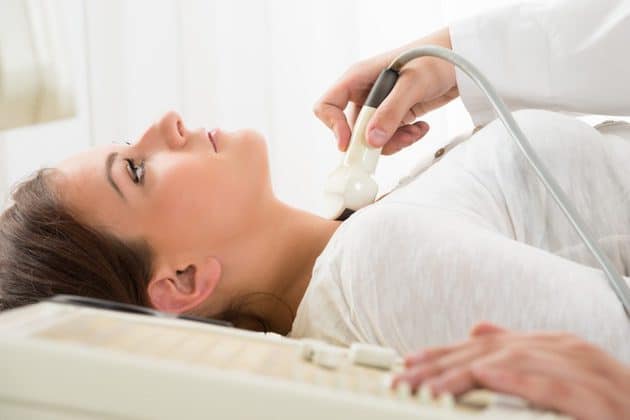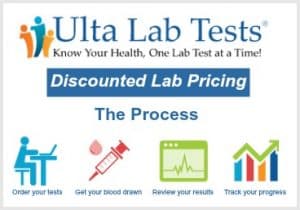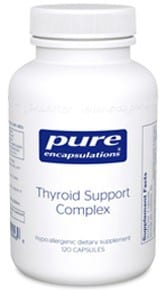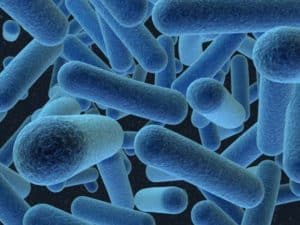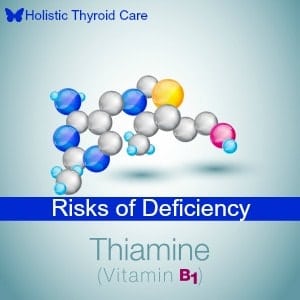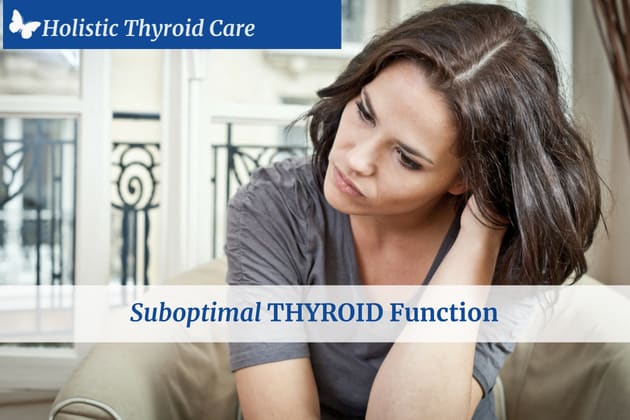
Have you ever been told your thyroid labs are normal and yet you regularly experience symptoms such as unexplained fatigue, weight gain, depression, stress, anxiety, dry skin, feeling cold, brain fog, and low libido? These vague and often troubling symptoms are often difficult to diagnose and are usually dismissed by physicians as “just getting older.” While this collection of symptoms affects women more than men, there are plenty of men who experience the same feeling of being “run down” or “not themselves” and could be the early warning signs of suboptimal thyroid function.
Suboptimal thyroid function is a condition sometimes referred to as subclinical hypothyroidism. Your doctor may have checked your thyroid using only the standard blood tests and declared your results are in the “normal” range. Unfortunately, too many people with subclinical thyroid function are overlooked and live with uncomfortable symptoms along with an increased risk of common disorders.
The Magnitude of Suboptimal Thyroid Function
More than 27 million Americans suffer from some form of a thyroid condition, and nearly half of these, or approximately 13 million, remain undiagnosed.
As a result, they agonize in silence with no apparent treatment for their underlying disorder. While it is true that with age, the risk of having low thyroid function increases, it is unacceptable and unnecessary to suffer from it as we age (or at any age for that matter.)
Conventional mainstream medicine has been at a loss to recognize suboptimal thyroid function. Fortunately, several bioactive nutrients have been identified that address the main causes of suboptimal thyroid function and help address symptoms.
Why is the Thyroid Gland Important?
The thyroid gland is part of the endocrine system that secretes hormones to regulate body functions such as burning fat for energy and for maintaining proper blood lipid levels.
Daily stress, age, and poor diet can interfere with the functioning of the endocrine system. The thyroid hormones T3 and T4 play a major role in metabolism and energy regulation. Like all aspects of biology, a balance of T3 and T4 hormones is essential to health and well-being.
When the thyroid gland is “sluggish,” production of thyroid hormones slows down, resulting in diminished metabolic activity in the body. Classic symptoms of suboptimal thyroid function include unexplained fatigue (and naps & rest don’t help), weight gain, depression, stress, anxiety, skin changes, low libido, and feeling cold at room temperature.
Suboptimal thyroid function is often overlooked by mainstream doctors. The is because what is considered to be the “normal” range level for thyroid stimulating hormone (TSH) is far too broad. As a result, it is easy to dismiss or overlook a problem with the thyroid gland. If a person falls into the “normal” range, doctors are hesitant to consider a thyroid problem despite the obvious symptoms reported by the patient.
When TSH levels are tested, a score above or toward the high end of “normal” indicates suboptimal thyroid function. The reason is that a high TSH level indicates low thyroid hormone. When the pituitary gland detects there isn’t enough circulating thyroid hormone, it attempts to signal the thyroid gland (we need some thyroid hormone!) by secreting lots of TSH in an effort to restore thyroid hormone levels. The thyroid gland, however, doesn’t always respond to the TSH signal from the pituitary gland. Think of it as an alarm clock that keeps going off in the morning but it’s not working, the person doesn’t wake up.
For someone whose TSH level is at the higher end of the normal range and their T4 and T3 levels are in the low-normal range, they would likely be told by most conventional doctors they don’t have a thyroid problem. The patient is usually told “everything looks good,” and sent on their way when actually, they may be suffering from suboptimal thyroid function.
The Risk Factors of Suboptimal Thyroid Function
Most of the signs and symptoms of suboptimal thyroid function are so common and often vague that mainstream physicians are likely to “write them off” as simply “normal aging,” or as being related to anxiety or depression. This is a potentially deadly mistake! Studies show that suboptimal thyroid function can be an early stage of progression toward full-blown hypothyroidism. Research indicates measurements of TSH above 2.0 µIU/mL increase the probability of developing hypothyroidism. And both hypothyroidism and suboptimal thyroid function are linked to many preventable age-related health problems!
Please understand that a normal TSH level is considered to be around 0.45-4.5 µIU/mL, which is a very wide (10-fold) range. Studies show that people with elevated TSH (greater than 4.0 µIU/mL) are at higher risk of coronary heart disease than age-matched controls. Such patients also display other risk factors that include higher levels of triglycerides, “bad” LDL and VLDL cholesterol, and lower levels and protective benefits of HDL “good” cholesterol.
People with suboptimal thyroid function often go unnoticed by conventional physicians unless their TSH is over 4.5. Holistic Thyroid Care recommends the optimal TSH level should be between 1.0-2.0 µIU/mL. If an individual has been prescribed natural desiccated thyroid hormone replacement their TSH level may actually appear to be suppressed. This is typically related to the direct T3 in the medication and it does not necessarily indicate they’re actually hyperthyroid. This is one reason why it’s important not to dose thyroid medication solely on lab values. The patient’s symptoms must be considered, along with at-home self-assessments such as basal body temperature, heart rate, and blood pressure logs as well as the additional lab thyroid lab markers known as Free T3, Free T4, and Reverse T3. When assessing for autoimmune thyroid disease (Hashimoto’s, Graves, and Hashitoxicosis) it’s critical to test antithyroid antibodies: thyroperoxidase (TPO), thyroglobulin (TG), and thyrostimulating immunoglobulins (TSI) and additional diagnostics such as a thyroid ultrasound. There is also substantial evidence of a connection between suboptimal thyroid function and metabolic syndrome, insulin resistance, and chronic kidney disease.
The connection between thyroid function and these conditions is logical: the thyroid gland governs metabolic rate and these conditions reflect reduced metabolism which leads to obesity, as shown by studies linking increased body mass index (BMI) and waist circumference with elevated TSH.
Once body fat begins to increase, metabolic syndrome isn’t too far behind. In fact, four out of five metabolic syndrome components (increased waist circumference, elevated triglycerides, low HDL, and elevated glucose) have been associated with low-normal thyroid function, especially free T4 levels. Insulin resistance is a reflection of decreased transport of blood sugar into cells under the influence of insulin. Studies show that suboptimal thyroid function reduces cell membrane levels of the specific molecular glucose transporter that cells use to move glucose inside the cell.
Chronic kidney disease arises when blood flow through the kidneys becomes reduced enough to lower the amount of waste being filtered out and it is known to be associated with thyroid function. In a large population-based study of people in Norway with “normal” TSH levels, the higher the TSH, the lower the kidney’s normal filtration rate as evidenced by their eGFR (estimated glomerular filtration rate) levels. Those with TSH levels in the highest one-third of values were at a 31% higher risk for advanced chronic kidney disease, compared with those in the lowest one-third.
Major depression and bipolar disorder are other debilitating conditions that may be worsened by suboptimal thyroid function. One study found that women with the highest TSH levels had an almost 124% increased risk for major depression compared with those having the lowest levels.
Making matters worse, studies have shown that people with major depression who also have suboptimal thyroid function are less likely to respond positively to antidepressant medications and are more likely to have anxiety in addition to depression. In a recent meta-analysis roughly 50% of patients with difficult-to-treat depression had evidence of suboptimal thyroid function, while among patients who responded well to treatment, the prevalence was only 8% to 17%.
Women are more likely to have suboptimal thyroid function and they also experience the other associated health threats including amenorrhea and bone fractures.
How to Boost Suboptimal Thyroid Function Naturally
There are three main underlying causes of suboptimal thyroid function:
- Insufficient production of T4
- Decreased conversion of T4 to T3 (T3 is the active form / T4 must be converted)
- Increased production of RT3 (reverse T3) which blocks normal thyroid function
A multifaceted problem requires treatment or prevention with multitargeted therapies.
Scientists have found that a combination of specific nutrients can address the three main contributors to suboptimal thyroid function with a unique approach. Preclinical and clinical research indicates:
- Ashwagandha increases levels of T3 and T4
- Guggul, an extract of Commiphora mukul, enhances conversion of T4 to T3
- An extract of Korean ginseng reduces concentrations of the inactive form of thyroid hormone rT3 which inhibits free T3 from binding with receptor sites.
Ashwagandha Improves T3 and T4
Ashwagandha is a shrub grown in India and has a long medicinal history as an adaptogenic herb. Adaptogens have been utilized by traditional medicine to restore balance to the body.
Modern scientific techniques reveal some of Ashwagandha’s benefits that specifically apply to improve thyroid function. Ashwagandha supports the thyroid gland in part because it contains glycowithanolide bioactive compounds that reduce stress and cortisol levels. Along with reducing stress hormones, the root extract of Ashwagandha has been shown to increase serum concentrations of T3 and T4.
Both animal and human studies support this finding. In an early study of mice, Ashwagandha root extract was administered orally and their thyroid hormone levels were monitored. The results indicated that T3 increased by 18% and T4 by 111% after 20 days. As for human studies, one study looked at 10 of 60 subjects with established suboptimal thyroid function (along with bipolar disorder) as the baseline at the beginning of the study. They were treated daily with 500 mg Ashwagandha for two months. At the end of the treatment period, all of the patients receiving ashwagandha had an improvement in their TSH level and their T4 levels increased from baseline up to 24%.
For the patients who received a placebo instead of Ashwagandha, their T4 levels dropped from baseline as much as 23%, showing a significant decline in thyroid function. One patient’s TSH rose into the abnormal range, suggesting a worsening of thyroid function!
This study indicated that ashwagandha therapy can be a factor in improving thyroid hormone T4 and TSH levels.
Another way Ashwagandha supports healthy thyroid function may be through the reduction of cortisol (a stress hormone). People with thyroid diseases in general typically have elevated rates of stress & anxiety and depression as well as other stress-related disorders. Elevations of cortisol and stress increase reverse T3 (rT3), which interfere with the beneficial properties of T3.
As an adaptogen, ashwagandha is particularly effective for stress because of its ability to restore balance in metabolism and body functions. A human study of people with known chronic stress demonstrated that daily supplementation of 300 mg of ashwagandha reduced both scores on a stress assessment scale and serum cortisol levels. As the study’s authors concluded, “The findings of this study suggest that a high-concentration full-spectrum ashwagandha root extract safely and effectively improves an individual’s resistance towards stress and thereby improves self-assessed quality of life.”
Guggul Extract Improves T3 Levels
Guggul (Commiphora mukul) is a natural extract of sap from the Indian myrrh tree. Scientist’s have discovered that guggul helps prevent suboptimal thyroid function by enhancing the conversion of T4 to T3, which is the active form of thyroid hormone.
Traditionally, guggul has been used for treating low metabolism, which is frequently seen in patients with suboptimal thyroid levels.
Guggal contains ketosteroid molecules, which have shown strong thyroid-stimulating properties. One study found that when rats were given guggal, it increased iodine uptake by the thyroid gland and increased activity of vital thyroid enzymes. This resulted in increased oxygen consumption and enhanced metabolic effect.
A preclinical study helped explain how guggul enhances thyroid function. In the study published in Life Sciences, researches found that guggul supplementation increased the blood concentration of T3. This was accomplished by improving the conversion of the inactive form (T4) to the active form used by the body (T3).
A third study found that guggul increased the activity of the enzyme (5′-deiodinase) that converts T4 to T3.
Every cell in the body depends upon thyroid hormones for regulation of their metabolism. The normal thyroid gland produces approximately 80% T4 and 20% T3. Most T3 is formed in the peripheral tissues by the conversion of T4 to T3 by the 5′-deiodinase enzyme. T3 possesses about four times the hormone strength as T4.
Korean Ginseng Reduces Reverse T3
Korean ginseng is also an adaptogen and contains properties known as ginsenosides that have been shown to support thyroid function through a unique pathway.
With age, we accumulate an unhealthy amount of reverse T3 (rT3). Reverse T3 is inactive and the complete opposite of the healthy and active form of T3. The problem with excessive levels of reverse T3 is that it will bind to normally function T3 receptors and block active T3, thereby reducing vital metabolic activity. Traditional Asian practitioners discovered that Korean ginseng is an effective way to stop this action of reverse T3 from destroying the body’s healthy T3 activity.
The development of a fermented ginseng preparation that provides not only higher amounts of ginsenoside compounds but also enhanced absorption than standard ginseng extracts has shown to be beneficial. Studies in humans reveal that a specialized form of fermented ginseng extract called GS15-4 is absorbed 15.5 times as much in 24 hours and achieves a 27-fold higher peak concentration in serum, and reaches that peak in approximately a quarter of the time (3.29 hours versus 12.04 hours).
A human study of 54 adults with congestive heart failure demonstrated just how much of an impact ginsenosides from ginseng had on thyroid hormone levels. At the outset, all patients with heart failure had reduced levels of T3 and T4 along with higher levels of reverse T3. Treatment with ginseng extract by injection resulted in improved clinical outcomes in all patients in the study. What the researchers also found was a healthy increase of T3 and T4 levels along with a significant reduction of reverse T3 levels.
Another study looking at the application of Korean ginseng was evaluated to assess its effects on a classic symptom of suboptimal thyroid function: cold hands and feet. Cold hands and feet is more prevalent among women than men and is often a result of an imbalance of thyroid hormones. Eight female patients were given 500 mg of Korean ginseng powder in capsule form for eight weeks. Using various forms of measurement, the researchers noted that the women who took Korean ginseng during the study all had a “significantly higher skin temperature of the hands and feet.”
Korean ginseng has also been found in randomized controlled trials to improve energy and fatigue as well as low libido – both of which are common symptoms in women with low thyroid function.
Additional Thyroid Support
In addition to the traditional herbs of ashwagandha, guggul, and Korean ginseng, there are a few additional compounds which have been found to further improve thyroid function, including the two building blocks of T4 and T3. These supporting nutrients are:
- Tyrosine, the amino acid from which T3 and T4 are derived by the enzymatic addition of iodine atoms.
- Vitamin B12, which is often deficient in patients with thyroid disease.
- Vitamin A, which has been shown to improve serum TSH levels, helping to reverse the state of suboptimal thyroid function. Low thyroid function can impair the conversion of beta-carotene into vitamin A.
- A word about iodine. Most people consume more iodine than they realize and a true deficiency is rare. In addition, blood and urine tests are not reliable for determining a deficiency. While it is true that iodine is required for thyroid health, this does not suggest iodine should be used in supplement form; particularly in any dose above what a prenatal vitamin, a multivitamin or naturally occurring in certain foods would contain. Iodine has been shown to exacerbate thyroid antibodies and hypothyroid symptoms, so proceed with caution when considering supplemental iodine.
Summary
Suboptimal thyroid function is a major hidden threat, particularly for women of all ages as well as the elderly. It may explain many of the vague and difficult to diagnose symptoms that we experience as we grow older.
Ignoring symptoms of suboptimal thyroid function is a dangerous approach because the condition is strongly linked with many chronic disorders of aging, especially cardiovascular disease and metabolic syndrome.
It can be difficult to recognize suboptimal thyroid function, especially when those who have the condition also have lab testing results that fall within the conventional medicine models “normal” range. It is not difficult, however, to take steps to resolve it.
If you are experiencing symptoms that may be related to suboptimal thyroid function, such as:
- Fatigue
- Weight gain
- Dry skin
- Feeling cold
- Depression
- Stress / Anxiety
- Brain fog
- Sluggishness or constipation
You may want to consider supplementing with specific nutrients. Korean ginseng extract, ashwagandha, and guggul target three important mechanisms that contribute to suboptimal thyroid function by raising circulating levels of T4 and T3 thyroid hormones, boosting the activity of the enzyme responsible for converting T4 to T3, and reducing thyroid-hormone blocking reverse T3.
You may find welcomed relief from using nutrients that help to improve thyroid function by directly reversing the three processes that degrade thyroid function and leave you vulnerable ♥
Exercise Your Right to Know Your Numbers!
At Holistic Thyroid Care, we hear every day from our clients and readers “my doctor won’t order a complete thyroid panel” which is unfortunate. Most of the lab results we see from clients ordered by their conventional doctor include only two basic lab markers which do not reveal what is truly going on with the thyroid. The good news is that a complete thyroid panel may be self-ordered through our UltaLabs client portal. It’s easy, quick, and low-cost. The results are emailed to you within days! You can also add a practitioner to your account to allow them access to review your results, or you can simply print the report and take it to your next appointment. Take a peek at the complete thyroid panel we recommend:
Thyroid Health Panel – Advanced (includes thyroid antibodies)
*Be sure to check their homepage for monthly discount codes which may be used if available (and on any tests offered through UltaLabs). To learn more, our Quick Answer page will address any questions you may have.
Thyroid Support Complex is a comprehensive formula containing vitamins, minerals, and herbal extracts to support healthy thyroid cell metabolism and thyroid hormone function. Herbs and nutrients for optimal thyroid gland function*
This comprehensive thyroid support formula contains vitamins, minerals, and herbal extracts to nourish and support thyroid gland function. Healthy vitamin A, vitamin D, zinc and selenium status have been associated with maintaining healthy thyroid cell metabolism as well as triiodothyronine (T3) and thyroxine (T4) hormone function. Iodine and l-tyrosine are key components in the synthesis of thyroid hormones. Coleus extract contains forskolin, which has been shown to promote adenylate cyclase activity, supporting thyroid hormone metabolism. Research indicates that ashwagandha and guggul are also key factors for helping to sustain healthy thyroid function. Doubling as powerful antioxidants, vitamins A and C, along with selenium and guggul, combine with curcumin to neutralize free radicals that affect iodothyronine 5’-monodeiodinase enzyme activity, the limiting factor in the conversion of T4 to the more active T3 hormone.*
Read Next:
Hashimoto’s Risk Factors
References
- Adlin V. Subclinical hypothyroidism: deciding when to treat. Am Fam Physician. 1998 Feb 15;57(4):776-80.
- Heinrich TW, Grahm G. Hypothyroidism presenting as psychosis: myxedema madness revisited. Prim Care Companion J Clin Psychiatry. 2003 Dec;5(6):260-66.
- Blackwell J. Evaluation and treatment of hyperthyroidism and hypothyroidism. J Am Acad Nurse Pract. 2004 Oct;16(10):422-5.
- Baumgartner C, Blum MR, Rodondi N. Subclinical hypothyroidism: summary of evidence in 2014. Swiss Med Wkly. 2014;144:w14058.
- Mohandas R, Gupta KL. Managing thyroid dysfunction in the elderly. Answers to seven common questions. Postgrad Med. 2003 May;113(5):54-6, 65-8, 100.
- Vanderpump MP, Tunbridge WM, French JM, et al. The incidence of thyroid disorders in the community: a twenty-year follow-up of the Whickham Survey. Clin Endocrinol. 1995 Jul;43(1):55-68.
- Tieche M, Lupi GA, Gutzwiller F, Grob PJ, Studer H, Burgi H. Borderline low thyroid function and thyroid autoimmunity. Risk factors for coronary heart disease? Br Heart J. 1981 Aug;46(2):202-6.
- Triolo M, de Boer JF, Annema W, Kwakernaak AJ, Tietge UJ, Dullaart RP. Low normal free T4 confers decreased high-density lipoprotein antioxidative functionality in the context of hyperglycaemia. Clin Endocrinol (Oxf). 2013 Sep;79(3):416-23.
- Triolo M, Kwakernaak AJ, Perton FG, de Vries R, Dallinga-Thie GM, Dullaart RP. Low normal thyroid function enhances plasma cholesteryl ester transfer in Type 2 diabetes mellitus. Atherosclerosis. 2013 Jun;228(2):466-71.
- Van Tienhoven-Wind L, Dullaart RP. Low normal thyroid function as a determinant of increased large very low density lipoprotein particles. Clin Biochem. 2015 May;48(7-8):489-94.
- Van Tienhoven-Wind LJ, Dullaart RP. Low-normal thyroid function and the pathogenesis of common cardio-metabolic disorders. Eur J Clin Invest. 2015 May;45(5):494-503.
- Kitahara CM, Platz EA, Ladenson PW, Mondul AM, Menke A, Berrington de Gonzalez A. Body fatness and markers of thyroid function among U.S. men and women. PLoS One. 2012;7(4):e34979.
- Roos A, Bakker SJ, Links TP, Gans RO, Wolffenbuttel BH. Thyroid function is associated with components of the metabolic syndrome in euthyroid subjects. J Clin Endocrinol Metab. 2007 Feb;92(2):491-6.
- Maratou E, Hadjidakis DJ, Kollias A, et al. Studies of insulin resistance in patients with clinical and subclinical hypothyroidism. Eur J Endocrinol. 2009 May;160(5):785-90.
- Van Tienhoven-Wind LJ, Dullaart RP. Low-normal thyroid function and the pathogenesis of common cardio-metabolic disorders. Eur J Clin Invest. 2015 May;45(5):494-503.
- Asvold BO, Bjoro T, Vatten LJ. Association of thyroid function with estimated glomerular filtration rate in a population-based study: the HUNT study. Eur J Endocrinol. 2011 Jan;164(1):101-5.
- Joffe RT, Levitt AJ. Major depression and subclinical (grade 2) hypothyroidism. Psychoneuroendocrinology. 1992 May-Jul;17(2-3):215-21.
- Kim EY, Kim SH, Rhee SJ, et al. Relationship between thyroid-stimulating hormone levels and risk of depression among the general population with normal free T4 levels. Psychoneuroendocrinology. 2015 Aug;58:114-9.
- Chakrabarti S. Thyroid functions and bipolar affective disorder. J Thyroid Res. 2011;2011:306367.
- Morganti S, Ceda GP, Saccani M, Milli B, Ugolotti D, Prampolini R, Ceresini G. Thyroid disease in the elderly: sex-related differences in clinical expression. J Endocrinol Invest. 2005;28(11 Suppl Proceedings):101-4.
- Ylostalo P, Kujala P, Kontula K. Amenorrhea with low normal thyroid function and thyroxine treatment. Int J Gynaecol Obstet. 1980;18(3):176-80.
- Wirth CD, Blum MR, da Costa BR, et al. Subclinical thyroid dysfunction and the risk for fractures: a systematic review and meta-analysis. Ann Intern Med. 2014 Aug 5;161(3):189-99.
- Jatwa R, Kar A. Amelioration of metformin-induced hypothyroidism by Withania somnifera and Bauhinia purpurea extracts in Type 2 diabetic mice. Phytother Res. 2009 Aug;23(8):1140-5.
- Mishra LC, Singh BB, Dagenais S. Scientific basis for the therapeutic use of Withania somnifera (ashwagandha): a review. Altern Med Rev. 2000 Aug;5(4):334-46.
- Panda S, Kar A. Changes in thyroid hormone concentrations after administration of ashwagandha root extract to adult male mice. J Pharm Pharmacol. 1998 Sep;50(9):1065-8.
- Panda S, Kar A. Withania somnifera and Bauhinia purpurea in the regulation of circulating thyroid hormone concentrations in female mice. J Ethnopharmacol. 1999 Nov 1;67(2):233-9.
- Panda S, Kar A. Guggulu (Commiphora mukul) potentially ameliorates hypothyroidism in female mice. Phytother Res. 2005 Jan;19(1):78-80.
- Panda S, Kar A. Guggul u (Commiphora mukul) induces triiodothyronine production: possible involvement of lipid peroxidation. Life Sci. 1999;65(12):PL137-41.
- Dai X, Zhou Y, Yu X. Effect of ginseng injection in treating congestive heart failure and its influence on thyroid hormones. Zhongguo Zhong Xi Yi Jie He Za Zhi. 1999 Apr;19(4):209-11.
- Ven Murthy MR, Ranjekar PK, Ramassamy C, Deshpande M. Scientific basis for the use of Indian ayurvedic medicinal plants in the treatment of neurodegenerative disorders: ashwagandha. Cent Nerv Syst Agents Med Chem. 2010 Sep 1;10(3):238-46.
- Panda S, Kar A. Changes in thyroid hormone concentrations after administration of ashwagandha root extract to adult male mice. J Pharm Pharmacol. 1998 Sep;50(9):1065-8.
- Gannon JM, Forrest PE, Roy Chengappa KN. Subtle changes in thyroid indices during a placebo-controlled study of an extract of Withania somnifera in persons with bipolar disorder. J Ayurveda Integr Med. 2014 Oct-Dec;5(4):241-5.
- Musselman DL, Nemeroff CB. Depression and endocrine disorders: focus on the thyroid and adrenal system. Br J Psychiatry Suppl. 1996 Jun (30):123-8.
- Chandrasekhar K, Kapoor J, Anishetty S. A prospective, randomized double-blind, placebo-controlled study of safety and efficacy of a high-concentration full-spectrum extract of ashwagandha root in reducing stress and anxiety in adults. Indian J Psychol Med. 2012 Jul;34(3):255-62.
- Shen T, Li GH, Wang XN, Lou HX. The genus Commiphora: a review of its traditional uses, phytochemistry and pharmacology. J Ethnopharmacol. 2012 Jul 13;142(2):319-30.
- Tripathi YB, Malhotra OP, Tripathi SN. Thyroid Stimulating Action of Z-Guggulsterone Obtained from Commiphora mukul. Planta Med. 1984 Feb;50(1):78-80.
- Sugawara M, Lau R, Wasser HL, Nelson AM, Kuma K, Hershman JM. Thyroid T4 5’-deiodinase activity in normal and abnormal human thyroid glands. Metab Clin Exp. 1984 Apr;33(4):332-6.
- Available at: http://www.endocrineweb.com/conditions/thyroid/how-your-thyroid-works. Accessed September 1, 2015.
- Available at: http://fitsweb.uchc.edu/student/selectives/Luzietti/Thyroid_hormones.htm. Accessed September 1, 2015.
- Huang CJ, Geller HM, Green WL, Craelius W. Acute effects of thyroid hormone analogs on sodium currents in neonatal rat myocytes. J Mol Cell Cardiol. 1999 Apr;31(4):881-893.
- McCormack PD, Thomas J, Malik M, Staschen CM. Cold stress, reverse T3 and lymphocyte function. Alaska Med. 1998 Jul-Sep;40(3):55-62.
- Jin H, Seo JH, Uhm YK, Jung CY, Lee SK, Yim SV. Pharmacokinetic comparison of ginsenoside metabolite IH-901 from fermented and non-fermented ginseng in healthy Korean volunteers. J Ethnopharmacol. 2012 Jan 31;139(2):664-7.
- Park KS, Park KI, Kim JW, et al. Efficacy and safety of Korean red ginseng for cold hypersensitivity in the hands and feet: a randomized, double-blind, placebo-controlled trial. J Ethnopharmacol. 2014 Dec 2;158 Pt A:25-32.
- Oh KJ, Chae MJ, Lee HS, et al. Effects of Korean red ginseng on sexual arousal in menopausal women: placebo-controlled, double-blind crossover clinical study. J Sex Med. 2010 Apr;7(4 Pt 1):1469-77.
- Sait Gönen M, Kisakol G, Savas Cilli A, Dikbas O, Gungor K, Inal A, Kaya A.Assessment of anxiety in subclinical thyroid disorders. Endocr J. 2004 Jun;51(3):311-5.
- Montgomery KA. Sexual desire disorders. Psychiatry (Edgmont). 2008;5(6):50-5.
- Available at: http://fitsweb.uchc.edu/student/selectives/Luzietti/Thyroid_hormones.htm. Accessed August 5, 2015.
- Available at: http://www.ncbi.nlm.nih.gov/books/NBK20/. Accessed August 5, 2015.
- Ness-Abramof R, Nabriski DA, Braverman LE, et al. Prevalence and evaluation of B12 deficiency in patients with autoimmune thyroid disease. Am J Med Sci. 2006 Sep;332(3):119-22.
- Wang YP, Lin HP, Chen HM, et al. Hemoglobin, iron, and vitamin B12 deficiencies and high blood homocysteine levels in patients with anti-thyroid autoantibodies. J Formos Med Assoc. 2014 Mar;113(3):155-60.
- Farhangi MA, Keshavarz SA, Eshraghian M, Ostadrahimi A, Saboor-Yaraghi AA. The effect of vitamin A supplementation on thyroid function in premenopausal women. J Am Coll Nutr. 2012 Aug;31(4):268-74.
- Maharshak N, Shapiro J, Trau H. Carotenoderma–a review of the current literature. Int J Dermatol. 2003 Mar;42(3):178-81.

